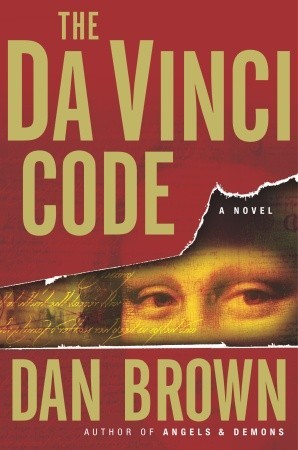The stakes are raised when Langdon uncovers a startling link: the late curator was involved in the Priory of Sion—an actual secret society whose members included Sir Isaac Newton, Botticelli, Victor Hugo, and Da Vinci, among others. Langdon suspects they are on the hunt for a breathtaking historical secret, one that has proven through the centuries to be as enlightening as it is dangerous. In a frantic race through Paris, and beyond, Langdon and Neveu find themselves matching wits with a faceless powerbroker who appears to anticipate their every move. Unless they can decipher the labyrinthine puzzle, the Priory’s secret—and an explosive ancient truth—will be lost forever.
Kim's Review: I bought this book solely because a) I knew it was/had been popular, and b) because the hardcover was a mere eighty-six cents at the thrift store. When I picked up this book, I expected to read something resembling the Sherlock Holmes stories. In that aspect, I was pretty satisfied. It is an interesting story, but the cons seem to outweigh the pros on this one.
By the time I'd gotten to the hundredth page, I was already looking forward to finishing it - and not in a good way, in the "I just want to know how it ends so I can start reading this book my grandma lent me" way. I got annoyed with the writing far too quickly considering how long this book is. Dan Brown seems to think that all of his readers are idiots and simply cannot comprehend the information given to them or draw their own conclusions. Every little detail is pointed out and stated by the characters either out loud or in their thoughts, and it just felt unnecessary because I was easily able to draw my own conclusion and get the same result a few paragraphs ago. Everything is spelled out; it's like Brown tells you what to feel about the situation instead of letting you feel what comes naturally. It got irritating after a while and felt really condescending.
And Brown isn't the literary genius he seems to think he is. Have you ever heard of the writing rule "show, don't tell?" Apparently, Brown has not - again, everything is spelled out for the reader. The writing is simple, and okay at best.
Another thing that annoyed me was the lack of character development in the main character, Robert Langdon. I never learned anything about his personality, and if anything was mentioned at all, it must have been in passing because I surely don't remember it. Then again, the entire book only takes place over one day, so I'm not sure how much his character could develop in that time. It did seem like Sophie, his "sidekick," and the other minor characters developed more than he did.
I wasn't crazy about the ending either. I can't really say much without spoiling it, but the end of the last chapter...ugh. There was nothing to elude that those events were going to happen throughout the entire novel, and then all of a sudden it happens and it's like, what? Where did that come from? (I'm aware of how vague that sounds and I apologize, but I'm trying my best to avoid spoilers).
This book was interesting, but it was a little too long considering something huge only happens every 200 pages or so. I believe there's a prequel to this, but I won't be reading it.



No comments:
Post a Comment
Go ahead and comment!